Former Japanese Prime Minister Abe Shinzo was assassinated on July 8 while delivering a campaign speech in Nara, Japan. Abe, 67, stepped down as Japan’s longest-serving prime minister in September 2020 due to health concerns.
His career as a widely respected conservative politician spanned nearly three decades and garnered several memorable photo opportunities, several of which are revisited below.
Abe was a stalwart ally of the United States during both of his tenures as Japan’s prime minister (2006-2007 and 2012-2020).
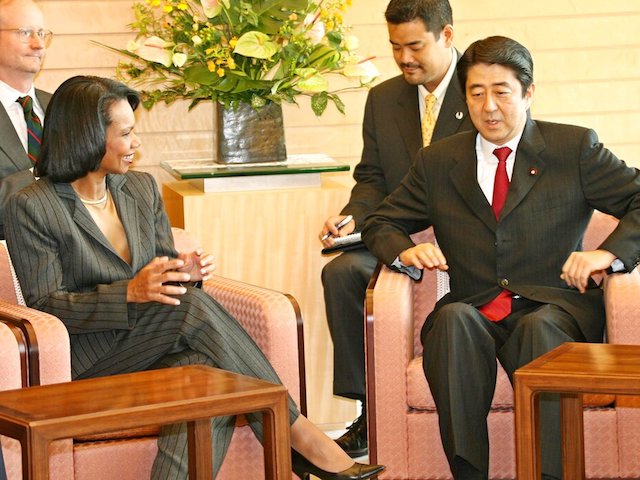
Abe meets with former U.S. Secretary of State Condoleezza Rice in Tokyo in October 2006. (AP Photo/Yoshikazu Tsuno)
Abe maintained a friendly relationship with former U.S. President George W. Bush and visited him in the U.S. in 2007. Both Abe and Bush hailed from political dynasties. Abe’s grandfather, Kishi Nobusuke, was prime minister of Japan from 1957 to 1960. Abe’s father, Abe Shintaro, served as Japan’s foreign minister from 1982 to 1986. Bush’s grandfather, Prescott Bush, served as a U.S. senator from 1952 to 1963. Bush’s father, George H. W. Bush (Prescott’s son) served as the 41st president of the U.S from 1989 to 1993.
Prescott Bush and Nobusuke golfed with former U.S. President Dwight D. Eisenhower in the U.S. in 1957. Washington described the sporting event as symbolizing a “renewal” of diplomatic ties between the U.S. and Japan following WWII (1939-1945), a conflict in which the two countries fought on opposing sides.
Abe led Tokyo’s support of Washington in response to the terrorist attacks on U.S. soil on September 11, 2001, by al-Qaeda, an international jihadist terror organization.
“Activities by the Japanese Self-Defense Forces [SDF] based on the Japan-U.S. alliance were expanded drastically to cover areas including the Indian Ocean and the Middle East, on top of the Far East, in the course of the U.S.-led war on terrorism after the Sept. 11 terror attacks on the United States 20 years ago,” Japan’s Nippon news website recalled in September 2021.
“During the war, the Japanese government dispatched Maritime SDF vessels to the Indian Ocean to refuel warships from countries such as Britain and France, as well as the United States, while a permanent law enabling the dispatch of the SDF abroad was established,” Nippon noted.
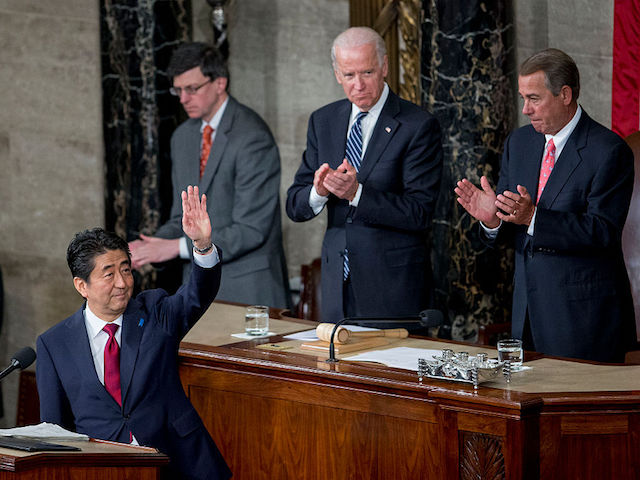
Abe waves after addressing a joint meeting of the U.S. Congress in Washington, DC, in April 2015. He is pictured standing near then-U.S. Vice President Joe Biden in the House Chamber at the U.S. Capitol. (Andrew Harrer/Bloomberg via Getty Images)
Abe was the first Japanese prime minister ever to address a joint meeting of the U.S. Congress. He delivered a speech titled “Toward an Alliance of Hope” that centered on Tokyo’s “strong belief in democratic principles and ideals that Japan associates herself with the free nations of the world.”
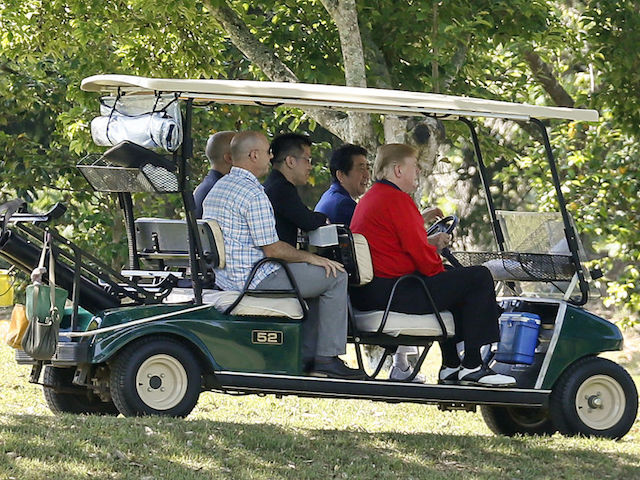
Abe pictured golfing with former U.S. President Donald Trump in Japan in May 2019. (Kimimasa Mayama/Pool via Bloomberg)
As mentioned above, Abe’s grandfather Nobusuke, golfed with former U.S. President Dwight D. Eisenhower in 1957 as part of a symbolic gesture to demonstrate healed ties between the two sides post-WWII.
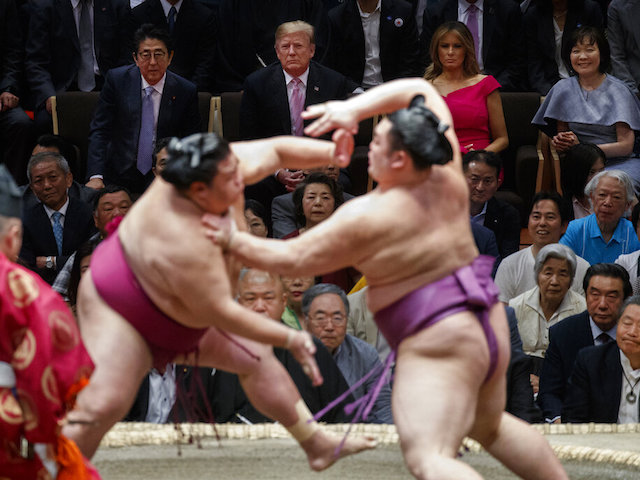
Former President Donald Trump attends the Tokyo Grand Sumo Tournament with Abe at Ryogoku Kokugikan Stadium, Sunday, May 26, 2019, in Tokyo. (AP Photo/Evan Vucci)
Japan’s foreign ministry described the first couple as “the first State Guests [to visit Japan] after the enthronement of His Majesty the Emperor on 1st May 2019,” referring to Japanese Emperor Naruhito. Trump was the first world leader to meet Naruhito after he was enthroned as emperor.
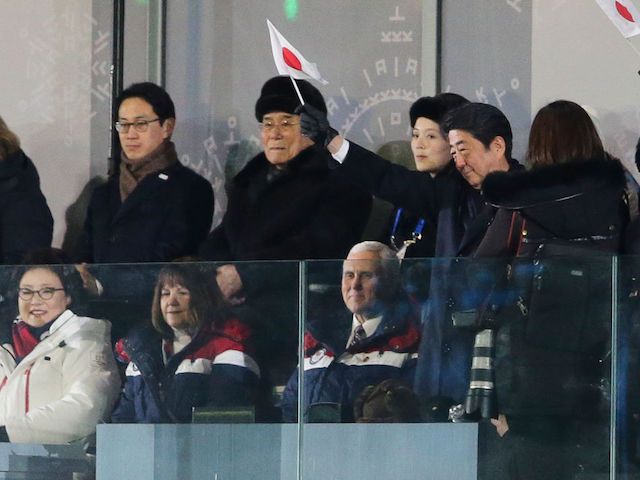
Abe attends the opening ceremony of the 2018 Winter Olympic Games in PyeongChang, South Korea in February 2018. He is pictured in the same spectator box as former U.S. Vice President Mike Pence and North Korean leader Kim Jong-un’s sister, Kim Yo-jong, apparently waving a Japanese flag in Kim’s face. (Jean Catuffe/Getty Images)
North Korea and Japan do not have any functional diplomatic relationship and North Korean state media routinely decries Japan as a rogue, imperialist nation, harkening back to Imperial Japan’s behavior in World War II. North Korea and America have been technically at war for 70 years.
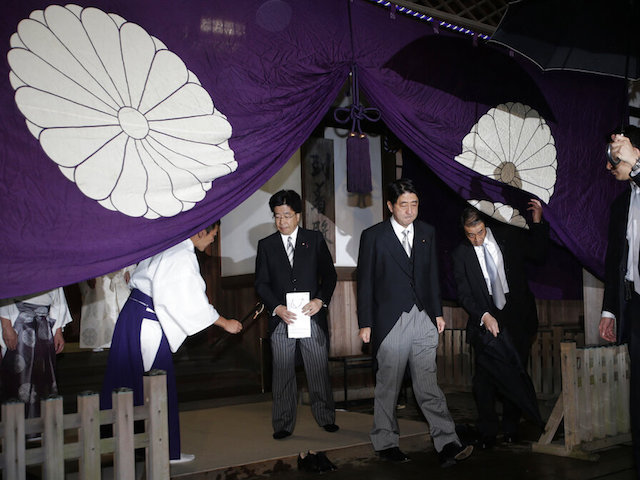
Abe, center, leaves the Yasukuni Shinto Shrine after paying homage to the war dead in Tokyo, Wednesday, October 17, 2012. (AP Photo/Shizuo)
Abe is pictured leaving Tokyo’s Yasukuni Shinto Shrine to Japan’s war dead in October 2012. The shrine was established in 1869. Visits to the shrine by Abe and other Japanese statesmen have stoked controversy among Chinese observers as it honors Japanese war criminals from World War II. Japan and China fought each other during the conflict.
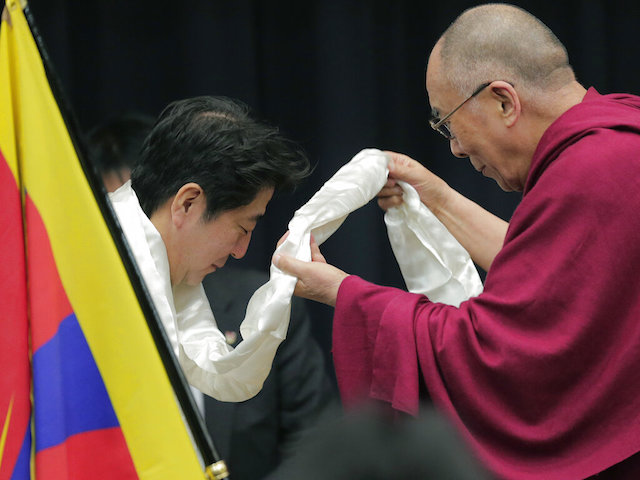
Abe is gifted a white scarf by the 14th Dalai Lama, a Buddhist monk, in Tokyo in November 2012. (AP Photo/Itsuo Inouye)
Tibetans consider the 14th Dalai Lama to be both a spiritual and political leader of Tibet, which is a Buddhist kingdom located north of India and occupied by China’s ruling Communist Party in 1950. Abe was a vocal critic of the Chinese government’s oppression in Tibet and elsewhere, including its illegal encroachment on Taiwan and Hong Kong. He also spoke out in support of Uyghur ethnic minorities in occupied East Turkistan, where the Chinese Communist Party has committed genocide against the ethnic minority since about 2017, as designated by the U.S. State Department.
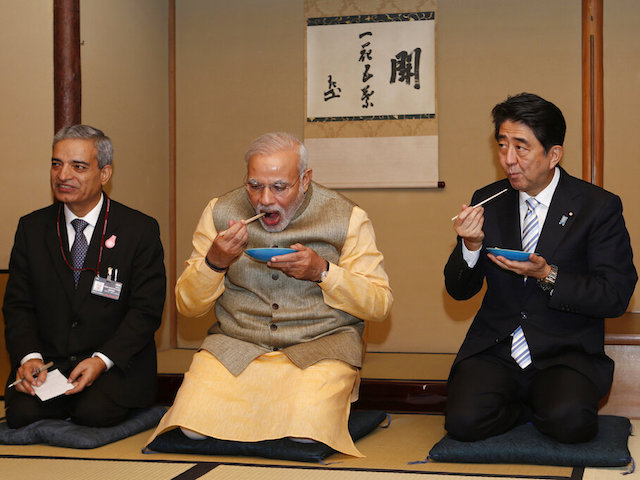
India’s Prime Minister Narendra Modi (C) and Abe (R) enjoy tea cakes during a tea ceremony at the Omotesenke, one of the main schools of Japanese tea ceremony, tea hut in Tokyo September 1, 2014. (Yuya Shino/Pool/Bloomberg via Getty Images)
Abe brought Japan closer to India by making concerted efforts to bolster their bilateral ties during his years as prime minister.
“[T]o Abe goes much of the credit for the transformation of India-Japan ties in the last two decades, including the Japanese funding for ambitious projects such as the Mumbai-Delhi Industrial Corridor and the Mumbai-Ahmedabad bullet train,” the Indian Express noted July 9.
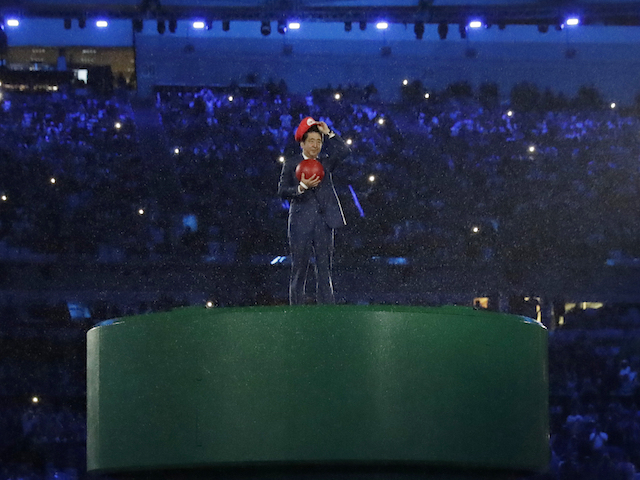
Abe appears during the closing ceremony in the Maracana stadium at the 2016 Summer Olympics in Rio de Janeiro, Brazil, Sunday, August 21, 2016. (AP Photo/Matt Dunham)
The prime minister made a special appearance in Brazil to promote Tokyo’s hosting of the 2020 Summer Olympics, which were ultimately postponed to 2021 due to the Chinese coronavirus pandemic.
In addition to close ties with the United States, Abe attempted to mend relations with Russia. Since Japan and the former Soviet Union never signed a peace treaty, Russia and Japan remain technically in war status since World War II. Nonetheless, Abe attempted to build ties with Russian leader Vladimir Putin, often using dogs.
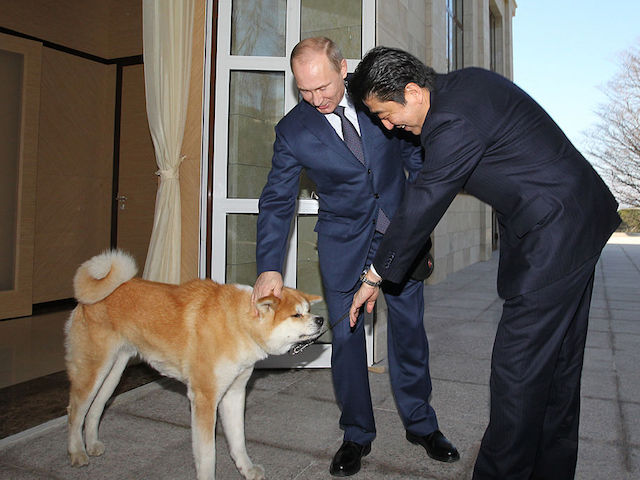
Russian President Vladimir Putin (L) with a Akita Inu dog called Yume greets Abe (R) at the Bocharov Ruchey state residence in Sochi, Russia, February 7, 2014. (Sash Mordovets/Getty Images)
Abe greets a pet dog of Russian leader Vladimir Putin in Sochi, Russia, in February 2014 during a visit to the country to participate in the 2014 Winter Olympics in Sochi. The Japanese prefecture of Akita gifted Putin the dog in July 2012, according to the Russian government’s official website.
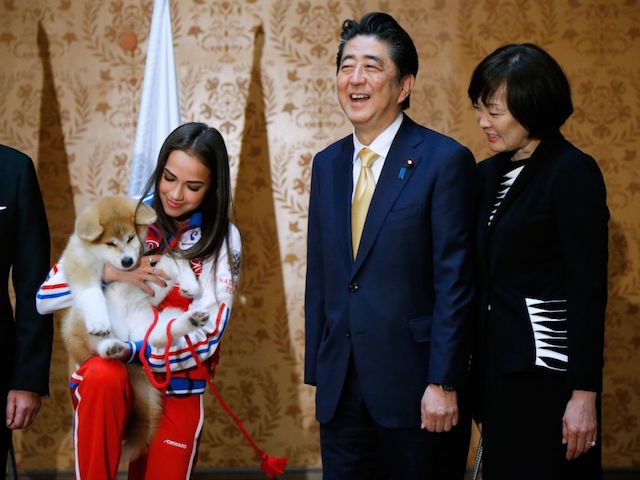
Abe meets with a Russian figure skating Olympic gold medalist, Alina Zagitova, in Moscow in May 2018 during an official visit to Russia. Abe is seen presiding over a ceremony in which the Japanese government gifted an Akita puppy to Zagitova. (ALEXANDER ZEMLIANICHENKO/AFP via Getty Images)
“The three-month old female puppy has been offered to the teenage Pyeongchang Winter Olympic gold medalist by a group dedicated to preserving the Japanese breed,” Reuters reported at the time.
“Abe petted the fluffy dog before it was handed over to the 16-year-old Zagitova. Zagitova fell in love with the breed while training in Japan before and during the Olympics and asked her parents to let her have an Akita puppy if she won the Games,” according to the news agency.
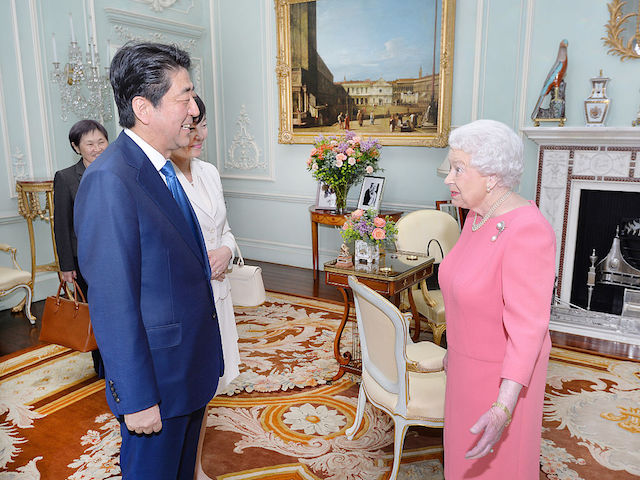
Abe meets with Britain’s Queen Elizabeth II in London on May 5, 2016. (John Stillwell – WPA/Getty Images)
Abe and his wife, Akie, enjoyed a private audience with the Queen Elizabeth II in 2016 at Buckingham Palace during a trip Abe made to Europe and Russia that summer. Abe spoke to reporters from London on the same day he met Queen Elizabeth, in which he said the following:
Three weeks from now, the G7 Summit to be held in Ise-Shima, Japan will turn that determination into action. I intend to make the G7 Ise-Shima Summit a venue for taking a major step forward in joining hands to deal with the various challenges facing the world.
The G7 nations [world’s largest economies], which share the fundamental values of freedom, democracy, human rights, and the rule of law and have driven world peace and prosperity, have great responsibility in this regard.
One of the major outcomes reaped from my visit to Europe was that I was able to share that sense of mission and sense of responsibility with Prime Minister Cameron, with whom I have just held summit talks.
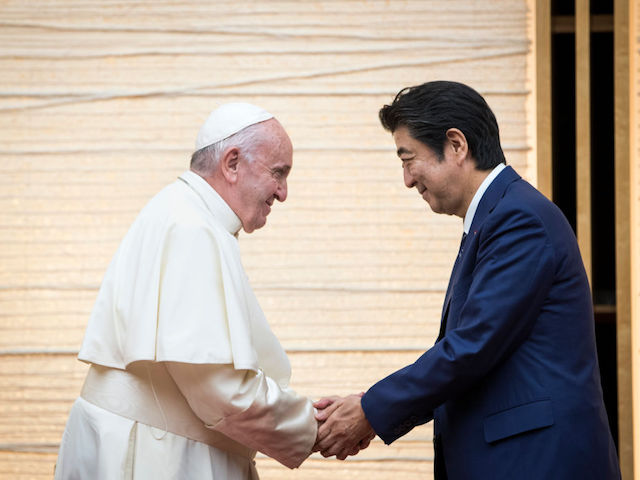
Abe meets with Pope Francis, the head of the Catholic church, in Tokyo in November 2019. (Behrouz Mehri/Getty Images)
Pope Francis’s 2019 visit to Japan was only the second in history by a sitting pope. Pope Francis advocated for nuclear disarmament during his meeting with Abe.
Japan’s foreign ministry summarized some of the topics discussed by the two leaders at the time, writing:
Japan, as the only country to have ever suffered atomic bombs, has a duty to lead the effort of international community to realize a “World without Nuclear Weapons.” Prime Minister Abe continued with his determination that “we will tenaciously endeavor to realize a “World without Nuclear Weapons” with maintaining the Three Non-Nuclear Principles, deepening understanding of the reality of atomic bombs, and making an effort to take a bridging role between nuclear-weapon states and non-nuclear weapon states. In response, His Holiness Pope Francis welcomed Japan’s efforts and expressed support for Japan’s determination.
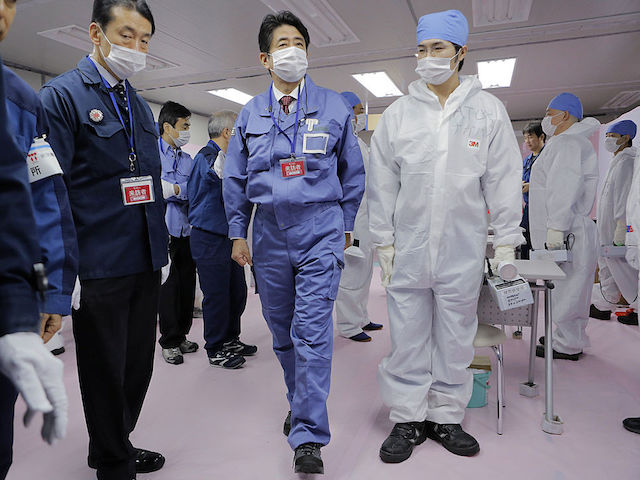
Abe inspects an emergency operation center of the Tokyo Electric Power Co. (TEPCO) at the Fukushima Dai-ichi nuclear power plant in Okuma in Fukushima, Japan in December 2012. (AP Photo/Itsuo Inouye)
The Japanese leader visited the Fukushima Dai-ichi nuclear power plant several months after an earthquake and related tsunami caused a meltdown at the nuclear power plant in March 2011. The event was a historic natural disaster that caused devastating consequences, including severe damage to the region’s environment and economy that continues today.
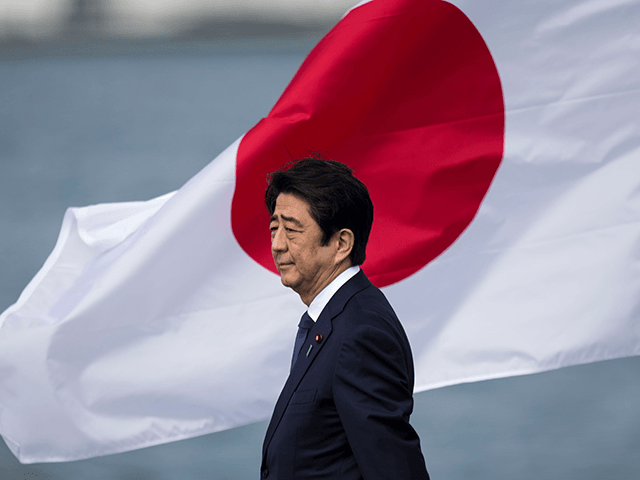
COMMENTS
Please let us know if you're having issues with commenting.